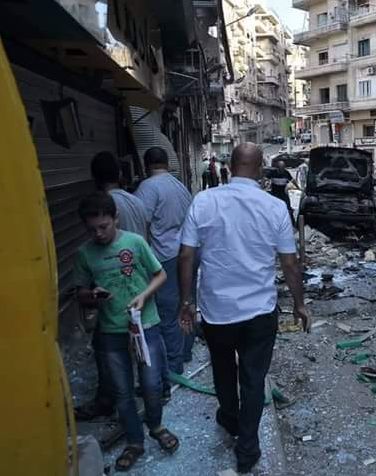
The rising of Aleppo
(From Terrasanta.net)
Rubble, houses and roads destroyed for kilometers. This is the most painful stage of our journey to Syria, where it’s hard to hold the commotion.
“Welcome to Aleppo!” The road signs indicating the entrance to the ancient capital of the North, sound almost like a joke. While signs of the bloody battle that a few weeks ago has managed to expel the rebel forces, are the most noticeable scar in this great city. But not even the war was able to destroy man. The people on the sidewalks smile, and cars have started circulating again. Even some commercial activity has begun to function again, and in the evening lights from the windows illuminates the homes of the citizens of Aleppo.
Just around the corner, however, there are only buildings that have been destroyed by missiles and bombs. Children play with the debris of the houses while elderly people, rummage in the garbage to find something to eat. Then we see many soldiers who are hungry and look terribly bored: this is what remains of the so called “Paris of the Middle East.” Water comes and goes, as well as electricity. Who knows how long it will take to rebuild everything … How much work has to be done to ease the pain of those who lost their wives, children, homes and loved ones.
Even the dead have no peace in this war. When the Latin parish priest Ibrahim Alsabagh takes us to the cemetery he shows us a myriad of graves entirely uncovered. “We had no cases of desecration fortunately, but many thieves came to steal what the relatives of the deceased had put next to their loved ones during the burial”, he says.
In that destroyed cemetery, a young Syrian is working. His name is Tarek, who is about to repaint the chapel destroyed by the bombing. We go on with our visit to some houses damaged by bombing and now recovered thanks to a project supported by the Association pro Terra Sancta. The ambitious aim is to allow 29 families to return to live in their homes, “This is also a way to encourage those who have fled the country to return.”
The parish of Saint Francis never stops working for people: drinking water wells are always available for people who cannot afford it, and several buses run every minute to distribute it beyond the Azizieh district. Thursday is dedicated to the distribution of food parcels.
In the hostel we meet Bashir, a boy who is about five years old. The father is missing somewhere and the mother does not work. The only hope they have to survive is through the help they receive every week from the parish. Bashir is shy, but he smiles when he sees us. Like him, hundreds of people are waiting for their turn in the lounge. Everyone receives a voucher which can buy food and medicines that are needed. But first Br. Ibrahim invites all to pray to invoke the gift of the long-awaited peace in Syria. Bread is important, but it is not everything.
In St. Louis hospital we meet Giudy, who is 11 years old, with her mother. Giudy was hit by two mortar shrapnel that entered into her brain. Probably she will never wake up again from deep coma in which she entered. She only opens and closes her eyes. Her mom is Muslim, but she keeps on looking at the icon of the Blessed Virgin, hanging on the wall. And when Ibrahim makes the sign of the cross on the white face of her little girl, she is moved, and smiles at her daughter.
Welcome to Aleppo, where hope and pain are intertwined in a difficult bond to be dissolved, but the town has slowly started to come back to life. Finally, after a long, long time.